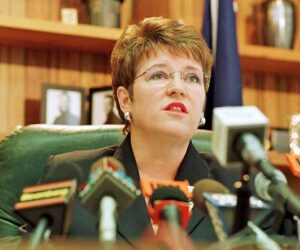2000: Radical Conservatism
March 16, 2022
By AHNZ
 Jenny Shipley failed to have National 4.0 re-elected in 1999. She had been Prime Minister almost exactly 2 years, having executed a successful leadership coup against Prime Minister Jim Bolger. Helen Clark’s Labour 5.0 came to power leaving Shipley to battle the high odds against an Opposition Leader not being replaced by a smoking crater where their ambitions formerly stood.
Jenny Shipley failed to have National 4.0 re-elected in 1999. She had been Prime Minister almost exactly 2 years, having executed a successful leadership coup against Prime Minister Jim Bolger. Helen Clark’s Labour 5.0 came to power leaving Shipley to battle the high odds against an Opposition Leader not being replaced by a smoking crater where their ambitions formerly stood.
In April 2000 Shipley wasn’t yet done. At the National Party Regional Conference in Wellington she gave her Dare to be Radical speech. It was an attempt to re-build the party by straddling two constituencies: The young ‘radical’ shoots and the older ‘conservative’ roots.
In his Evening Post cartoon, Tom Scott pulls at Shipley’s stitching and calls her garment oxymoronic: Radical Conservatism, “What’s that mean?” “It’s the same thing as virile impotence!” Ref. AHNZ, Facebook
“New Zealanders voted for change. We have 2 ½ years to change their minds…We’ve listened to the electorate and we’ve learnt lessons.”
“Being radical, in the sense I want to talk about today, means going back to our roots.”
“If we look too at the reason for National’s formation, we find a set of strong, simple, clearly-stated ideas: that individuals are the best managers of their own destiny; that the State makes a mess when it tries to interfere in people’s lives”
“As we do so we must create a groundswell. Radical in reflecting our roots. Radical in public appeal.” – Shipley speech, Scoop (29 April 2000)
“Radical conservative,” as she described the label to no doubt bemused party members at their weekend regional conference, is an attempt to straddle two constituencies…As political parties invariably do when they lose office, National is going to tend to its roots for a while….When a party starts clutching at labels – as National last did in the dying stages of the Holyoake and Muldoon eras – it is a sign that it is probably not living up to them. In those previous bouts of navel- gazing, National told itself it was a “liberal conservative” party, and in the final throes of Muldoonism it philosophised earnestly about freedom and private enterprise.” – Just how ‘radical’ can Shipley be?, NZ Herald (30 June 2000)
“The political parties of the day and the leaders within the New Zealand community must devise and express policies in such a way that they do not cause division and do no polarise people’s thinking.” – Shipley’s maiden speech to parliament (c.1987)
“Look at Bill English. He has spent most of the time since he replaced Jenny Shipley as Opposition Leader – another Big Mother figure who was for ever hectoring us about our naughtiness – agreeing with everything the government has been doing, purportedly because he wants to occupy the same “middle ground” as the government does.- The Politically Incorrect Show – 05/11/2001, Free Radical
“Thank you for the opportunity to address you…Throwing more money at Government programmes is not the way ahead. I am meeting more Maori who can see that enterprise, self-reliance and a strong community are the way ahead.” – Bill English (2002, ) Scoop
“Kia ora koutou katoa, Da jia hao, Namaste, Sat Sri Akal, Assalamu alaikum, Talofa lava, Malo e lelei, and good morning everyone. Thank you so much for joining me here today…National knows people can do more for themselves – if they are backed, encouraged, and supported on a path to independence.” – Christopher Luxon (2022,) Newshub
 Jenny did not survive to take Radical Conservatism to the 2002 election because she was replaced by Bill English the following year. Shipley had never been a radical at all as her maiden speech shows. Perhaps she was trying to pretend she was one to combat a perception of being too vanilla at a time when Labour was looking old-fashioned, backward-looking, and nostalgic. Jenny wanted to capture for herself and National, I think, some of the exciting differentiation of the radical parties like ACT, New Zealand First, and Alliance.
Jenny did not survive to take Radical Conservatism to the 2002 election because she was replaced by Bill English the following year. Shipley had never been a radical at all as her maiden speech shows. Perhaps she was trying to pretend she was one to combat a perception of being too vanilla at a time when Labour was looking old-fashioned, backward-looking, and nostalgic. Jenny wanted to capture for herself and National, I think, some of the exciting differentiation of the radical parties like ACT, New Zealand First, and Alliance.
Shipley had a similar task in holding on as Leader as did Judith Collins after losing her General Election in 2020. Both women were associated with previous National regimes which were a liability to re-branding National as a fresh break and renewing alternative to the Labour Executive in power. Neither could compete with Helen Clark (Labour 5.0) or Jacinda Ardern (Labour 6.0) and both were replaced by younger men who were not attached to the old guard: Bill English and Christopher Luxon.
Bill English did not try to be radical. In his run (October 2001 – October 2003) he emulated Labour 5.0 but snipped at their slip-ups (eg. Paintergate, Corngate, Doonegate, Speedgage, and Pledgegate.) This was a page out of the National Party’s old playbook established by Keith Holyoake’s National 2.0 to become the status quo seekers. In other words, keep mouthing the National Party’s constitutional values such as independence, self-reliance, individual enterprise, and supporting people doing for themselves. Meanwhile though, copy whatever status quo the Labour Government sets. Eventually this worked out for English but not until he allowed John Key to take point and reward the party with the National 5.0 Government.
Leading up to Luxon we had Don Brash and Judith Collins. Both were radicals as proven by both being contributors to the ultra-Libertarian The Free Radical magazine. They were what Jenny Shipley was trying, or pretending, she could be in 2000.
Christopher Luxon has reverted to the old copy-cat pattern identified in Harold Innes’ 1963 book The Status Quo Seekers. So much so that he has even revived Bill English’s 2017 status quo platform called the Social Investment Programme. Bill English rolled this Utilitarian sort of People Farming scheme as a sort of Nanny-State-With-Accountants plan to out-Labour the Labour party ahead of the 2017 election. However, just as in 2002, caving in to the Left was not enough for ‘Plain English’ Bill to beat an Ardern any more than it was a Clark.
“By favouring values such as individualism, small government, and even ironically, for a government that wanted less not more government in people’s lives, a paternalistic approach for those families under intense stress, the lens of social investment was narrowed to a pinpoint. A lens that failed to allow Bill English to see..” – Why Did New Zealand’s Social Investment Model Fail?, Jess Berentson-Shaw, policycommons.ac.nz (2018)
“Being prepared to invest in the right places to secure better long-term results for the most vulnerable New Zealanders, and save taxpayers money in the long run, is what Bill English called “social investment”. This will be back under National.” – Christopher Luxon (2022,) Newshub
Luxon, in refurbishing English’s old Social Investment software suite evidently thinks he can win power by being the biggest Nanny State Technocrat at election 2023. Results show that Kiwis accept such master plans provided there is someone charismatic enough to sell it to them. Holyoake, yes. Shipley, no. English, no. Key, yes. English, no again. Luxon, to be victorious, needs to get some good Prime-Ministerial exposure so New Zealanders will become affectionate toward him as a leader the way Holyoake did to beat Labour 2.0 in 1960.
The Radical Conservatism play is exciting to some voters but makes it easy for opponents to mount a polarising attack from the Left. As Shipley and Brash and Collins demonstrated it does not win elections so why do they even attempt it? My explanation is that these politicians were not first and foremost trying to win the General Election at all. Being a Radical Conservative has enough appeal within the National caucus and party for a Member to gain and keep the leadership. National voters actually believe their 1936 founding document is good and electable and are elated when a Leader behaves as if they do too. This is how Brash and Collins managed to cobble together enough support to become Leader in a desperate situation for the party but also the reason why they couldn’t win. Shipley resorted to Radical Conservatism in a desperate attempt to save her skin which prolongued her career 2 extra years after being defeated in 1999.
The next Nat who attempts to play the Radical Conservative Card will probably be in a desperate situation too. They will probably be an outsider quickly promoted, as was Brash and Key and Luxon, because nobody in the caucus currently (2022) has the credentials of a radical. They will certainly lose the General Election to Labour, as radicals always do, but on the other hand they can certainly loose better as a failed radical than they can as a failed Labour Lite copycat as Don Brash showed when he recovered Bill English’s lost ground.
New Zealand drifts further toward centralisation, globalism, and homogeneity as we have done since 1840. National actively respond to this trend by conforming to it as politicians but simultaneously create it as New Zealanders by passively accepting growing Statism as our destiny.
—
Ref. Tom Scott, Evening Post, 1 May 2000; Alexander Turnbull Library
Image ref. Shipley, Now To Love (2018)
Image ref. Young Bill; Stuff
 Like Comment Share
Like Comment Share





